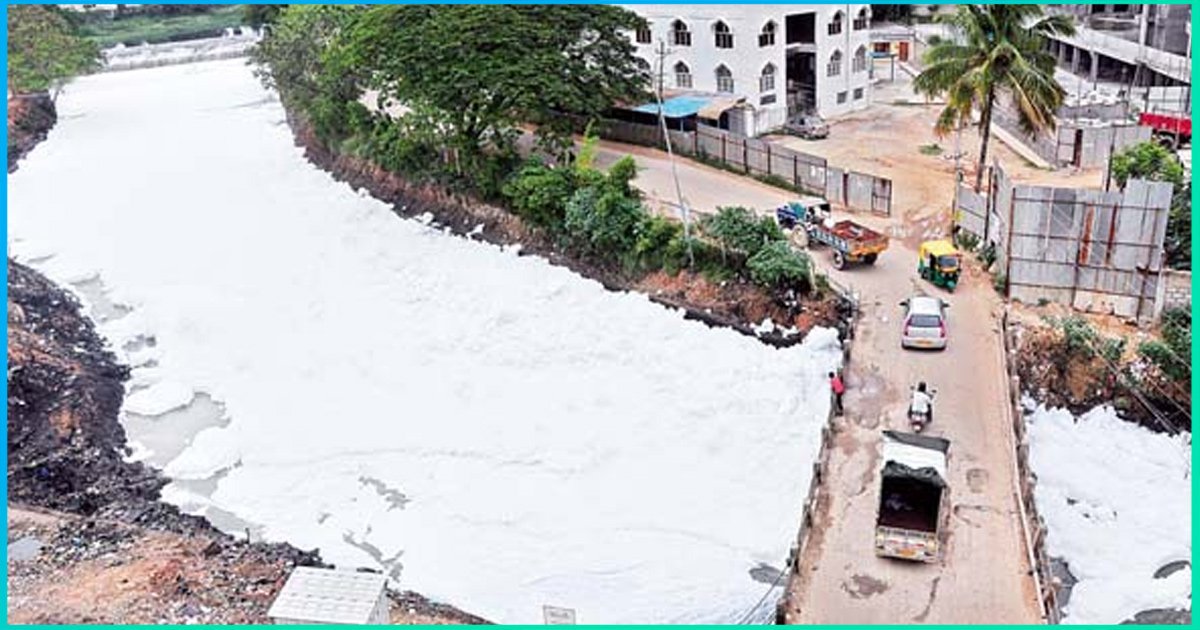
Bengaluru: Out Of 53 Water Bodies, Only Two Lakes Pass Quality Test
23 Feb 2018 1:00 PM GMT
The worsening condition of Bangalore’s water bodies have become the talk of the town, with the latest reports on the quality of water in the city’s tanks/lakes showed that only two water bodies – Agara Lake and Ulsoor Lake had qualified the test with satisfactory levels.
The recent data was concluded by the Karnataka State Pollutions Boards, which collected samples from 53 water bodies across the city in April and December last year. The statistics were gathered under two programs – Global Environment Monitoring System for freshwater (GEMS) and Monitoring of Indian National Aquatic Resources System (MINARS).
Out of the 53 water samples tested, 36 were fit for wildlife and fisheries, 11 lakes dried up during the testing period, four lakes were suitable for irrigation, industrial cooling and controlled waste disposal while the two lakes qualify the test with satisfactory levels.
The lakes which failed the test were not only unfit for consumption by humans but were even found unfit for consumption by animals. Also, the lakes which had the quality index at satisfactory level could be used for human consumption, only after it has gone through a thorough convention treatment.
The condition of the lakes might soon fall at worse levels similar to the Bellandur and Varthur lakes that are known for frequent frothing and fire. Some of the lakes with the poorest quality index included Somasundarapalya Lake in Bommanahalli, Puttenahalli Lake in Yelehanka, Shivapura tank and Karihobanahalli Lake in Peenya.
PREVIOUS YEAR
A Draft Report in which every water body was studied was presented by the Environmental Management and Policy Research Institute (EMPRI).
Of the samples taken during monsoons, 85% were categorized as Class E (used for irrigation and industrial cooling), 13% under Class D (breeding fish and wildlife propagation only) and the remaining 2% under Class C (disinfection and conventional treatment to make it portable). Not one lake tested was in Grade A (drinking water) or B (for bathing).
Similar Research conducted in 2016. KSPCB data showed that 53.8% of their monitored lakes were in grade E and the remaining in Grade D.
“The study indicated that a majority of the lakes in Bengaluru metropolitan area are under the deteriorated condition and unfit for direct human consumption,” stated the study.
WHAT ARE THE REASONS FOR DETERIORATING HEALTH?
Solid waste significantly affects 44.5% of water bodies, including burnt waste, batteries, CFL bulbs and the most harmful is construction debris, which not only clogs drains and decreases storage capacity of lakes, but can also lead to leaching of deleterious paints and chemicals.
Other wastes are agriculture processed by-products, poultry waste, including offal and other organic material that lead to increasing in vermin and insect population and reduces dissolved oxygen lakes, as well as a biomedical and industrial waste of ash, fibres and granite dust.
Other than this, sewage is found to be flowing directly into 29% of the water bodies.
“The sewage inflow, various pollution loads from different sources and changing land use patterns are imposing detrimental effects on the quantity and quality of water,” stated the report that suggested up gradation and construction of Sewage Treatment Plants (STP).
STEPS TAKEN
For Bellandur Lake last year, closure notices under the Section 33 (A) of the Water Preventional and Control of Pollution Act 1974 were issued to 114 industries operating in the Bellandur Lake’s catchment area by the Karnataka State Pollution Control Board (KSPCB) following the national Green Tribunal’s orders.
For Varthur Lake, the main reason for pollution was to the direct dumping of untreated sewage from apartments and industries into the Lake.
The Karnataka Government said it would take the necessary steps to improve its quality; however, no steps had been taken so far.
As far as the recent Agara Lake test results are concerned, a senior official from the KSPCB told TOI, “Though Agara Lake test results showed poor water quality, the water body has become better in the past few months due to the efforts of Karnataka Lake Development and Conservation Authority. Even the fishing area of Ulsoor Lake has good quality water because the BBMP has been maintaining it.”
There was a time when Bengaluru was referred to as “Kalyananagar” (the city of lakes) and the “City of thousand lakes.”
It is being said that after Cape Town, Bengaluru might be one of the cities heading towards Day Zero.
 All section
All section













